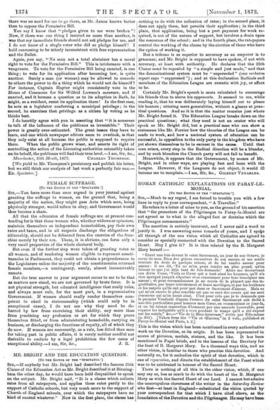MR. BRIGHT AND THE EDUCATION QUESTION. (To THIS EDITOR OF
THB "SPECTATOR:') SIR,—If anybody but Mr. Bright had described the famous 25th Clause of the Education Act as Mr. Bright described it at Birming- ham the other day, he would have been held disqualified to speak on the subject. Mr. Bright said, "It is a clause which collects rates from all ratepayers, and applies these rates partly to the support of Catholic schools, but very much more to the support of Church-of-England schools, over which the ratepayers have no kind of control whatever." Now in the first place, the clause has nothing to do with the collection of rates; in the second place, it does not apply them, but permits their application ; in the third plebe, that application, being but a part payment for work re- quired, is not of the nature of support, but involves A drain upon the resources of the school ; and in the fourth place, the ratepayers, control the working of the clause by the election of those who have- the option of working it.
But a tribune is as superior to accuracy as an emperor is to grammar, and Mr. Bright is supposed to have spoken, if not with accuracy, at least with authority. He declares that the 25th Clause must be repealed by "a simple and just mode," and that. the denominational system must be " superseded " (one verbatom report says " suppressed ") ; and at this declaration Radicals and members of the Education League are ecstatic with joy, or affect to be.
Certainly Mr. Bright's speech is more calculated to encourage his friends than to alarm his opponents. It seemed to me, while reading it, that he was deliberately laying himself out to please his hearers ; uttering mere generalities, without a glance at prac- tical questions. And so it is that the matter remains just where Mr. Bright found it. The Education League breaks down on the practical questions ; what they need is not an orator who will speak as Mr. Bright did, but a practical man who can show a statesman like Mr. Forster how the theories of the League can be- made to work, and how a national system of education can be. successful, in opposition to the only party in the kingdom who have- yet shown themselves to be in earnest in the cause. Until that. man arises, every step in the Radical direction will be a blunder, and by such blunders the Church party will not fail to benefit.
Meanwhile, it appears that the Government, by means of Mr. Bright, and in other ways, are playing fast and loose with the League. However, if the Leaguers do not object, it would ill become me to complain.—I am, Sir, &c., GILBERT VENABLES.


































 Previous page
Previous page